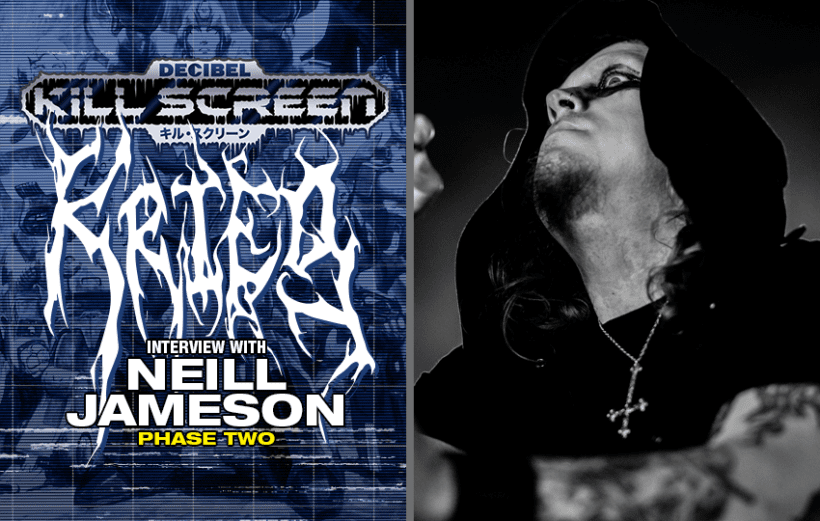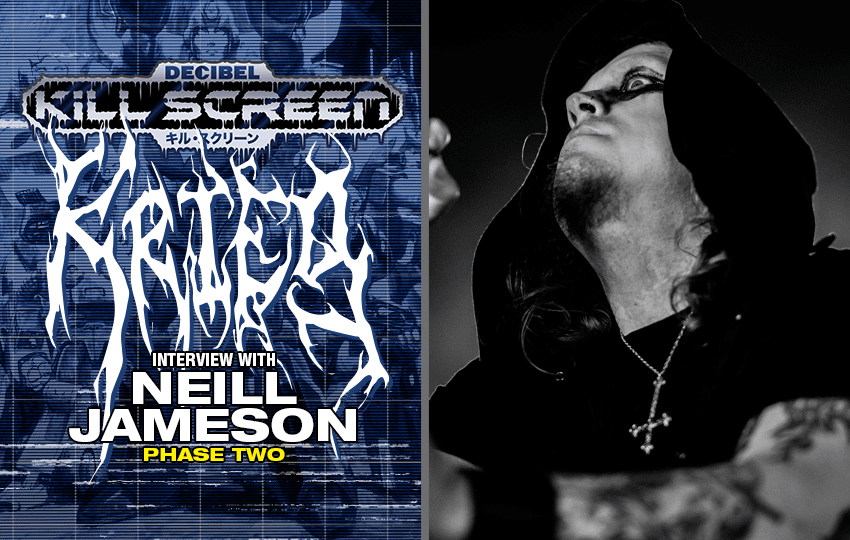
Photo by Hillarie Jason
What do Monty Python alum Eric Idle, late Unsolved Mysteries host Robert Stack, Star Trek’s original Dr. Spock Leonard Nimoy, actor and musician Scatman Crothers and legendary film director Orson Welles have in common? They were all cast as voice actors for 1986’s The Transformers: The Movie. Seriously! Hell, for Crothers and Welles, it was among their last performances before their deaths in 1986 and 1985, respectively. For any title, let alone an animated feature about fighting robots developed with the interest of selling toys to impressionable kids, that is an immense amount of star power. But that was certainly a fluke, one destined to stay in the ’80s. It was a simpler time.
Fast forward to 2025, and three of those youths turned serious adults are having a serious conversation concerning video games and its role in serious music. Decibel co-columnists Michael Wohlberg and James Lewis are joined by Krieg founding member Neill Jameson, and each person involved have been passionate gamers for the majority of their lives. Early in the discussion, however, the vocalist notices a classic Transformers toy placed on a shelf behind Lewis, leading to a brief but poignant tangent. What follows isn’t dealing with games, per se, but instead the overarching bubble which seems to surround that and similar interests; the nebulously defined “nerd culture.” We refer to ourselves as “Decibel’s co-nerds,” but when discussing a franchise that has garnered $1.5 billion in box office ticket sales since 2007, clearly we can’t be the only ones—or quite possibly even a minority. For the sake of clarity, Wohlberg and Lewis will be individually identified rather than keeping Kill Screen as a unified entity. If you’re just interested in gaming, we welcome you to check out phase 1 of our massive interview. Yet to stand divided, this exchange will surely fall, so we urge you to continue.
– – – – – – – – – – – – – – – –
So real quick, is that a Devastator behind you?
Lewis: [Smiles, nods] Yeah.
That’s fucking awesome. Is that an original G1 [Generation 1]?
Lewis: Yeah, yeah.
Beautiful.
Lewis: It was a gift from a friend of the family. I was into Transformers, years after it kind of hit a peak. I think they were cleaning out a garage and they knew I was into it. He brought it over one day. I remember he handed it to me and it was wrapped up in literally a black garbage bag. He was like, “Oh, I think you might like this.” And I was losing my shit. I was seven or something.
This corresponds a lot, because I remember The Transformers: The Movie came out and then that was right around the time that the NES was really starting to gain a lot of traction, too. So those are two concurrent memories that go along with me.
Lewis: I regularly listen to the Transformers animated soundtrack. I spin a lot of those songs all the time.
Nothing wrong with that, man. What about the Japanese stuff after season three? Did you get into that at all? Like Headmasters, Victory, any of that?
Lewis: I started revisiting it later in life and I enjoy it, but it’s really out there at times. This stuff gets pretty nuts, you know?
Big fan of Headmasters just because of how it continued the more violent storylines. The Marvel comics stayed dark as hell for the entire run. So getting to see a season that omits our season four and goes directly into what happens after the return of Optimus Prime and how there’s just characters killing themselves left and right in that, I mean, it’s great.
Lewis: Oh, I don’t remember that. I’ll have to check that out.
Check out the Soundwave versus Blaster fight where they both kill each other and then they’re rebuilt. It’s fantastic.
Lewis: Yeah, I will check that out!
Sorry, I didn’t mean to—
Lewis: No, I have all the time in the world for Transformers!
Wohlberg: I was going to say, I’m pretty sure you just made James’ night by pointing that out. [Laughs]
Lewis: Yeah, it was pretty awesome.
It made my night by seeing that! My favorite moment in the Transformers movie—outside of when Megatron’s reformatted into Galvatron—is when all the Decepticons are landing right in front of where the Autobots are hiding and the Constructicons form Devastator. The seriousness in Kup’s voice when he announces Devastator, like, This is the ultimate power—this is it, we’re fucked. I know a lot of people complained that, “Well, the other combiners were around because they came out in the ’85 season.” But I think if we would have had the Aerialbots or the Protectobots on the Autobots’ side and then Menasor and Bruticus on the Decepticons’, I think it would have taken a lot of the punch out of that because Devastator really did come across as just this ultimate fucking terror.
Lewis: The framing on that, too. If you remember when Daniel climbs up the ladder, it’s a hard black at the top and all dark reds around him. He just kind of peeks up and looks over and, like you said, then Kup shows up and says “Devastator.” It’s this huge, weighty moment. I think Megatron even yells, “Merge for the kill!” or something. The first thing he does is hammer through the top of this building. It’s like you said, if there was some other giant combiner that showed up and started taking shots at him and knocked him over, it wouldn’t have nearly the weight.
Yeah, that has exceptional emotional power to it.
Lewis: Absolutely.
Wohlberg: Understanding that this is a series about talking robots that turn into cars and other things, does it seem strange to you that people equate [properties] like Transformers as strictly kid stuff? I mean, we’re literally talking about fights where people die and robots are killing themselves.
But then if you can look at it in the cynical way, it’s like, “Well, the only reason why any of these characters are getting killed is because those characters were discontinued on the toy shelf, so they’re trying to introduce new characters to sell them.”
Lewis: Yeah, the movie takes place after season two and they were given the direction to wipe out the old cast so they could sell more toys. After that first season, they sold a ton of toys. And then the second season, I think it dropped off hard because people are like, “Well, I already have a bunch of these cool ones,” or, “It’s just a different version of Optimus,” or something. And then all of a sudden, you had this whole new cast of characters for kids to buy.
Yeah, I mean, this opened that up to it. There’s a whole bunch of unused storyboards from the Battle of Autobot City, where there’s way more characters that get killed: Mirage gets killed, Red Alert gets killed, Trailbreaker. I pay attention to a lot of Transformers YouTube channels and groups and all that and there’s just so much cynicism. “Well, I mean, the only reason they’re doing this is Hasbro needed to make room for more toys.” We’ve got that, and then you’ve got what you just said about people looking at that as something for kids. And yeah, I mean, it is—they’re toys. That’s what it is.
But I think that, especially when we’re adults, we kind of lose the fact that kids have a deep emotional life. They have the ability to create these narratives for the characters that they love. And these narratives that they create, while it may seem primitive or strange or even laughable to us as adults, that’s just as real and serious to them as children as someone watching Breaking Bad and getting all torn up because their favorite character died, or any of these series or movies that adults watch now that win all these awards. There’s really no difference.
Yes, there definitely is an aspect of suspended adolescence, which you can see in the fact that the Marvel movies continue to make way more money than anything else that comes out in Hollywood. Or you can look at how Star Wars is such an industry not only for children, but also for people of our age. But then you look at how that fandom talks to each other and how toxic it is, so there’s definitely an argument there for maybe just leaving it in childhood. It’s complicated now. It’s no longer just, “Hey, Trix for kids” kind of shit. Because nostalgia is marketed to us so heavily, there really isn’t a cutoff for childhood things anymore. It can follow you throughout your entire life, and you can even build successful careers on it.
Wohlberg: A big part of what I’m hoping to express with this column is exploring this dismissal of video games as being “nerd culture” or somehow lesser. For full disclosure, I started at Decibel in 2016. I first pitched to [Decibel editor-in-cheif] Albert [Mudrian] back then a video game column, and he flat out said no for two reasons: One, he hired me to be an art director, not a writer—so, fair, he didn’t know if I could write or not. And second, he said, “Nobody cares about video games.” And that was the one that like stuck with me. I didn’t push back, but I just felt like that was wrong.
And sure enough, fast forward to now and video games are basically one of the biggest industries in the world. They make more money than movies and music combined year over year. It is big business and it’s become popular culture. It’s become normal. And I genuinely believe that we’re going to get to a point in the not too distant future where people will have a favorite game and it won’t be looked at as nerd culture, much in the same way that people have favorite movies and it’s not weird. You don’t have to be a cinephile in order to watch a movie; it’s just what people do. And video games have become so ubiquitous over the years that it’s impossible to not then impact everything around it.
And we’re now seeing metal being made by kids who were born in the mid-’90s, late-’90s, early 2000s, who have never experienced a life without video games. And so when I ask, “Is it strange that it’s considered kid stuff?” Yeah, Transformers are owned by Hasbro. Everything, every major entertainment property, is owned by a large company that is trying to sell you something. There is no escaping that. There is going to be marketing tied into any kind of commercial art. But behind these series, there’s the fandom that takes it incredibly seriously to the point where you’re watching Transformers YouTube channels. But also, you have a team of people who are completely dedicated behind it. I’m sure there’s some entertainment properties where you have the cynical writers who are going in, just need a job, punch in, punch out, whatever. But for something like Star Wars or Transformers—or name any property from the ’80s—and you’re going to find people who would kill their fucking loved ones for the opportunity to work for that.
As somebody who was born in the late ’70s, grew up in the ’80s and is now a parent and somebody in their 40s who is a full-blown adult, are video games nerd culture? Is it strange for it to be considered on the same level as books and movies?
I’d say aspects of it are definitely nerd culture, but aspects of music is nerd culture. Aspects of sports can be considered nerd culture, especially when you look at fantasy football and stuff like that. On the flip side, it’s been normalized because of things like the Madden series or these AAA titles that become more than just video games. They go out and they become part of public consciousness. So in that respect, I don’t think that it really has the nerd culture tag that it used to. Or let’s say it still does have the nerd culture tag, but that doesn’t mean the same thing that it used to. It’s no longer a pejorative to be a nerd.
As far as it being looked at in the same way as books and movies and music, I have two answers to that. The first answer is the games that have an impactful, emotional narrative, that have obvious storytelling chops to it that can move along a story in a dramatic and emotionally impactful way, that’s no different than a book that can do that or a movie that can do it. On the flip side, there’s tons of shitty books and shitty movies that don’t have any kind of impact and those are popular as fuck now. Yeah, there’s tons of shitty video games that are completely vapid and mindless as well. They all kind of go together. I understand that writers and artists and musicians and all that can look at the digital sphere and think that, Well, it’s not art because it doesn’t come from a place of emotional creativity, or it’s somehow considered “not difficult to make.” I could sit and I could write a book without having any formal training and it could be great—especially if you enjoy a lot of cursing and cum jokes. But if I tell you I’m gonna sit down and make a video game with no training, I’m not gonna be able to fucking do that. I’m way too dumb to do that. I did not graduate college, and I did not graduate college because I’m terrible at math. And so I could never master the art form of creating a video game. So really, it’s just a lot of hot air.
These things are what you make of them. If it’s art to you and it impacts your life in that way, then it’s fucking art. If you look at it and you think like, Ah, that shit sucks, and it’s not a part of your life, then who fucking cares what you say? What somebody’s opinion on art is does not impact my enjoyment of something, and I would like to think that it wouldn’t impact others. I know that that’s not necessarily true and especially with people that are into sci-fi and fantasy or video games or all that, they can seem especially sensitive—or, at least, that’s the stereotype. But on that same token, you tell someone that you think their sports team fucking sucks, they could be just as pissy about that as somebody saying that your favorite video game character is a pussy.
In a way, I think we’ve transcended the nerd culture talk and the art talk because it really has just become such an interwoven part of our society—at least in Western society—at this point. And, you know, obviously Japan and whatnot. I think that anybody that still is hung up on these things being considered artistic expressions, they’re just doing that in order to get some kind of attention towards what their opinion is. It’s the proverbial hot take. And I’m hoping that eventually we get to a point in our society where we can just ignore that kind of shit, but unfortunately we seem to be like backpedaling constantly as far as our ability to utilize critical thinking. That kind of shit throwing is going to probably ramp up over the next few years.
Wohlberg: The one point to really underscore how far video games have come is the whole insanely stupid scandal with Elon Musk pretending that he was a really good Path of Exile II player because he thought that it would get him any kind of clout. Did you hear about that?
Yeah, but everything that he does is all because he was a lonely child and just wants friends.
Wohlberg: But I still find it amazing that the richest man in the world still finds that having to prove that he’s good at video games is a necessity.
Lewis: Yeah, like, “I’m cool! I can hang out with you guys!”
It’s because he has built so much of his image as being this tech super genius. Stereotypically, a lot of that is going to involve your recreation being around sci-fi and video games and all that. I mean, obviously you look at him and nobody’s gonna think that he was proficient in MMA or athletics or anything like that. It’d be like looking at me and thinking that I’m proficient in either of those things. He wants someone to think that he’s the best at something. And I think that with the stereotype of gamers being more isolated, somewhat right-leaning—especially going back to Gamergate and that kind of thing—he thinks that it’s his people. It’s the same stupid shit as him smoking weed on [The Joe Rogan Experience] a few years ago just trying to get acceptance. He sees subcultures and he tries to latch onto them because he’s so desperate for love and attention.
Wohlberg: I think my favorite observation of him is, “I’ve never seen an incel have so many kids before.”
Yeah. He’s up to, what? Like, fucking 14 now? One was just born pretty recently. Cynically, it proves the power of wealth.
Wohlberg: Sure does. All right, back to the fun stuff.
Ruiner is out now via Profound Lore Records and can be purchased here.
Follow Krieg on Bandcamp and Facebook.
Read Phase 1 of our interview with Neill Jameson here.

Sign Up for the Kill Screen Newsletter
Get the latest in Kill Screen interviews, videos and contests delivered right to your inbox with zero latency!
“*” indicates required fields

